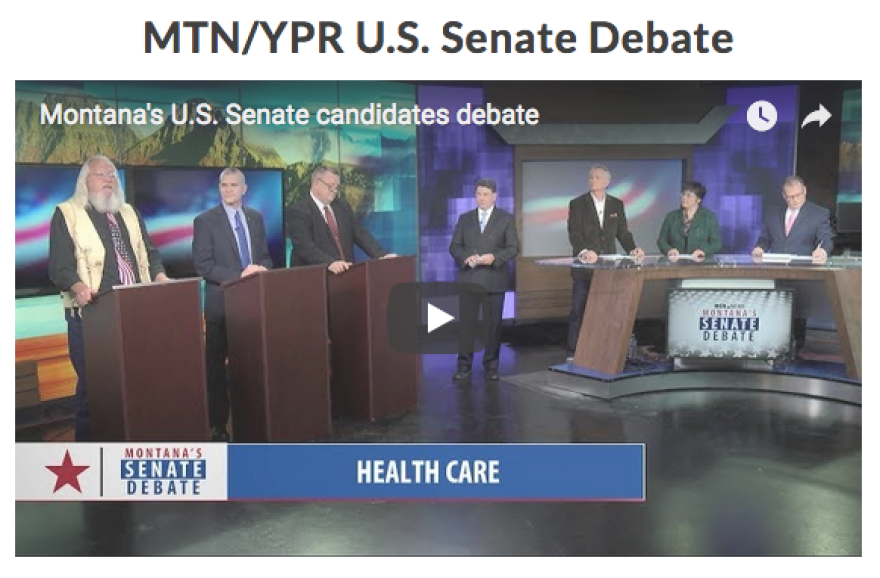The role for government when it comes to health care was just one of the topics where Montana’s U.S. Senate candidates disagreed during Saturday’s televised debate.
Did you miss Saturday's debate? YPR will rebroadcast the MTN/YPR U.S. Senate debate on Monday October 15, 2018 at 6 p.m.
State Insurance Commissioner Matt Rosendale was asked about the Republican’s short-term insurance plan.
These plans were originally intended to be temporary, with coverage up to 3 months. The intent was for people in between jobs or for those who briefly need inexpensive insurance. Last August, the Trump Administration issued new rules to allow Americans to buy these plans for up to 12 months at a time with the ability to renew. This short-term insurance plan circumvents the Affordable Care Act’s coverage requirements.
Rosendale was among those who praised the move as widening choice. So he was asked during the debate if these plans are so great, would he pledge to buy one to cover his own family?
Rosendale repeated that these plans give Montanans choice but didn’t answer the question, so he was asked it again.
“What I am saying Jackie, is we need to have a full range of options of health care plans for everyone to make a decision of what is best for them,” he said. “It is not a federally run, top down for the elitists to make a decision about what is best for you and what is not best for you.”
Under the ACA - also known as Obamacare - people choose their level of coverage based on their ability to pay. Open enrollment this year is from November 1st through December 15th.
Senator Jon Tester said junk insurance plans are called junk for a reason.
“And it’s why any responsible person would not buy a junk health insurance plan to support their families,” said Tester. “It’s why Matt would not answer that question.”
Then the Democrat raised his left hand. Tester said his family had one of those short-term type plans when he cut off the 3 middle fingers in a meat grinder accident, “and they didn’t cover anything.”
“I remember my father going, ‘we bought this insurance to have it when we needed it and when we needed it it wasn’t there,’” said Tester. “If you buy junk insurance - what the commissioner is promoting - you’ll have nothing when you get sick because it doesn’t cover pre-existing conditions.”
Tester said the only thing is these plans are cheap.
Libertarian Rick Breckenridge said the Constitution doesn’t say anything about the role of the federal government when it comes to insurance.
“Our business is to run the federal government not to make sure everyone has health care,” he said.
Breckenridge said as a veteran his health insurance comes from the Veteran’s Administration where pre-existing conditions are covered. But he thinks the decision whether to cover pre-existing conditions should be decided by employers or insurers.

Montana State University political scientist David Parker said the ACA provision that bans insurers from charging more or denying coverage because of a pre-existing health condition remains popular. He said doing away with that is often problematic for Republicans who are against Obamacare.
“And Matt Rosendale keeps saying, ‘look we’re going to take care and protect you if you have pre-existing conditions.’ The problem is his office has basically put out short-term policies that basically don’t protect all pre-existing conditions that have caps on them,” said Parker. “And your question was direct: would he put his family on them? He would not answer it. He said we just need to have choice.”
Parker thought it was Rosendale’s weakest moment in the debate.
“So I think that was an illuminating moment in the entire debate,” said Parker. “Did Matt Rosendale screw up? No, but he didn’t answer the question. And I think it’s because it’s a challenging question for him to answer.”
By contrast, Parker said it was Tester’s strongest moment in the debate because it directly showed how he and his family were impacted by what turned out to be a poor choice. He said they found that in that accident where Tester lost 3 fingers.
The Montana Television Network and Yellowstone Public Radio were the only sponsors to invite all 3 of the U.S. Senate candidates for the statewide televised debate. The Democrat and Republican U.S. Senate candidates debated September 29, 2018 on Montana PBS.
YPR will rebroadcast the October 13, 2018 MTN/YPR U.S. Senate debate on Monday October 15, 2018 at 6 p.m.




